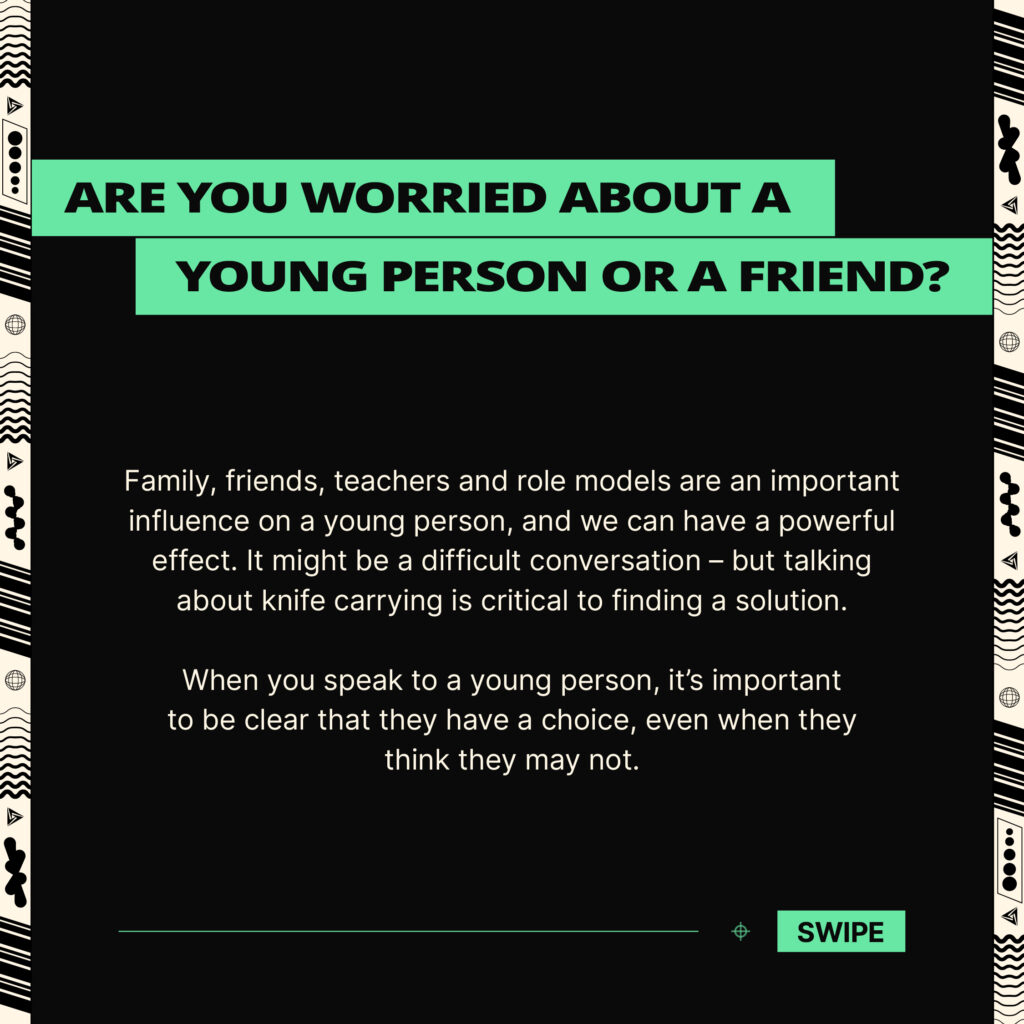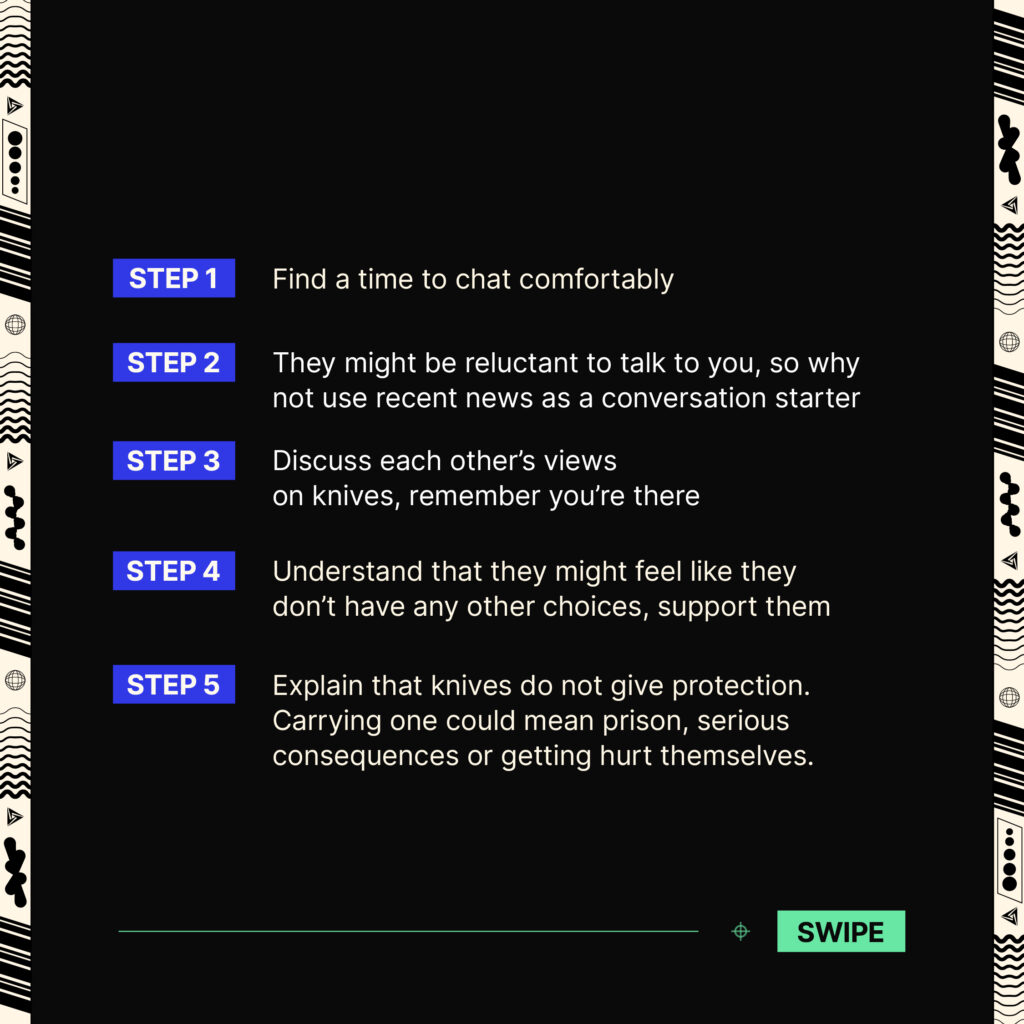What is knife crime?
Knife crime is any crime that involves a knife or sharp instrument. Offences with a knife can include threatening people, a robbery or burglary, a murder or assault. Simply carrying a knife – even if a young person hasn’t used it – is also considered a crime and can get them in trouble.

We Don’t Carry #LivesNotKnives
We Don’t Carry #LivesNotKnives is our anti-knife crime campaign that gives you the facts on the dangers of carrying knives. It’s never too late to help your child or a young person in your care make a positive change.
About knife crime
A young person may feel like they need to carry a knife because of the places they go or people they hang out with. But if they carry, their future is at risk. UK statistics show that not only are they more likely to be hospitalised with an injury caused by violence but they can get in trouble with the law. There’s no ‘safe place’ to stab someone either – any stab can be fatal and the consequences they could face will be just as severe.
99% of young people in England and Wales are living knife free today. A safer Leicester, Leicestershire and Rutland is possible.
Do you know who’s most likely to be convicted of carrying a knife?
It’s young men aged 12-25 and is often because they don’t feel safe. Young people also carry because of peer pressure and not having a full understanding of the legalities and dangers of carrying a knife.
When looking for warning signs that a young person may be carrying a knife, asking yourself the following questions can help:
- Has their attitude to school or education changed?
- Do they have new friends you’ve not met before?
- Are they protective and / or secretive with their bag and / or clothing?
- Have they been overly defensive when you’ve questioned them about their possessions?
- Do they send and receive more messages than they did before?
- Do they ever get up and leave the house abruptly?
- Are they out of the house more, particularly in the evenings and at night?
- Have they demonstrated a positive attitude towards those that carry knives, for example talking about self-defence?
- Have you noticed anything missing from your house that could be used as a weapon, like a kitchen knife or screwdriver?
There are many reasons why young people decide to carry a knife or weapon. These can include (but are by no means exhaustive):
- They fear being a victim of knife crime – this could be from a specific threat or a perceived fear.
- General self-defence – the ‘just in case’ reason.
- Peer pressure or being pressured into carrying it for someone else.
- They don’t know it’s wrong or they don’t know it’s illegal.
- To intimidate others.
- To earn respect.
- Involvement in other criminal activities.
How can I help?
Carrying a knife may make a young person feel safer but they’re actually increasing the risk of getting stabbed or injured themselves. They’re also breaking the law.
- Know what blades you have in the kitchen and in toolkits at home.
- Keep an eye out for any online purchases for blades.
- Online retailers tend to run fewer checks on who is buying goods than shops, so it’s a good idea to keep tabs on what packages are delivered to your home.
- Know what they’re up to online.
- Think about searching their bag and room. Is there evidence of drugs, extra money, or new clothes?
- Remember it might not be a knife but some other weapon.
- Know where they are and who they are with. Do they have a new circle of friends, and are they becoming less engaged with their family?
- Encourage them to ‘hang out’ in safe areas wherever possible.
You have options and there is support available. Remember:
- When young people are educated about the consequences of knife crime they may reconsider carrying one.
- Try to build their self-esteem and reinforce the importance of their life and what they can achieve to help them see a positive future.
- Take time to have a true conversation with them, be available and ready to listen.
- Remember to let their voice be the main one during the conversation.
- The fact that they do have a choice. There is always the opportunity to change things and go in a different direction.
- The law. It is illegal to carry a knife, even if it belongs to someone else, and come with a sentence of four years.
- The police. They will stop and search someone they believe is carrying a knife.
- Personal safety. The knife carried for protection could be used against the person carrying it.
- The consequence. Knife crime is considered a violent crime and can severely affect a young person’s ability to get a job. Carrying or using a knife doesn’t just affect that individual. When a knife is used, the individual’s family, the victim and the victim’s friends and family are all affected.
Start the conversation
Family, friends, teachers and role models are an important influence on a young person, and you can have a powerful effect. It might be a difficult conversation – but talking about knife carrying is the way to finding a solution and saving lives.
When you talk to a young person, remember to be clear that they have a choice, even when they think they don’t.
- Find a time to chat comfortably.
- Know they might be reluctant to talk to you, so you could use recent news as a conversation starter.
- Discuss each other’s views on knives, remember you’re there to listen and support them.
- Understand that they might feel like they don’t have any other choices. Help them to see that they do.
- Explain that knives do not give protection. Carrying one could mean going to prison or getting hurt themselves.
- Say the bravest thing to do is to walk away from a dangerous situation.
- Explore excuses with them that they can use to walk away. They could say they have to pick up a younger sibling or you could arrange to call them if they send you a message.
- Reassure them that most people their age and older do not carry knives.
Explain they can always report their concerns about someone carrying a knife anonymously through Fearless, an organisation designed to help young people.
Disposing of a knife
Where can I take a young person to safely dispose of a knife?
You can find amnesty bins in six different police stations across the Leicester and Leicestershire area. These bins allow anybody to get rid of knives without the fear of being punished, unless it is found to have been used for a criminal act.
Amnesty bins can be found at the following stations:
- Beaumont Leys Police Station, 2 Beaumont Way, Beaumont Leys LE4 1DS
- Braunstone Police Station, Hallam Crescent East, Braunstone Town, Leicester LE3 1FF
- Hinckley Road Police Station, 90 Norfolk Street, Leicester LE3 5QP
- Keyham Lane Police Station, Colin Grundy Drive, Hamilton LE5 1FY
- Mansfield House Police Station, 74 Belgrave Gate, Leicester LE1 3GG
- Spinney Hill Police Station, East Park Road, Leicester LE5 5GY
What is an offensive weapon?
I need help and support
There are lots of people out there to help and support you and a young person. Take a look at the below for more:
Childline offers a safe and secure place for young people to talk. They can help with knife-related advice or any other concerns you may have.
The Ben Kinsella Trust is one of the leading anti-knife crime charities in the UK, helping to create a society where no one suffers the loss of a life to knife crime.
No Knives Better Lives offers practical support and information on the effects of knife crime.



